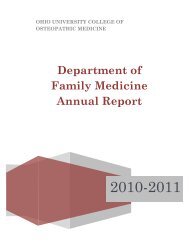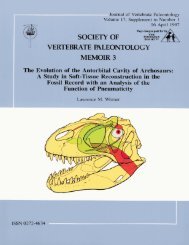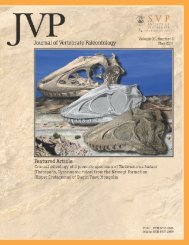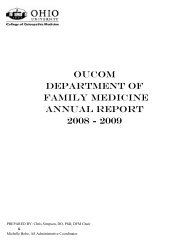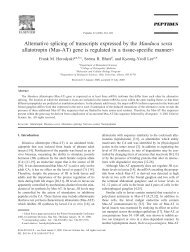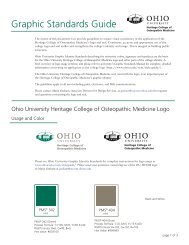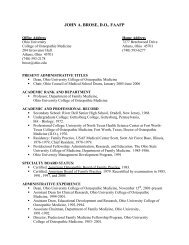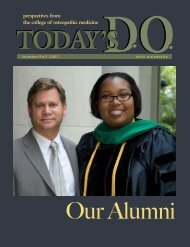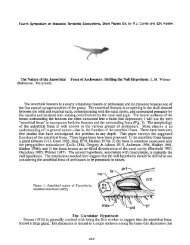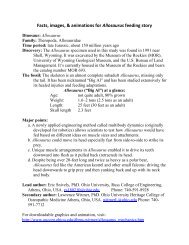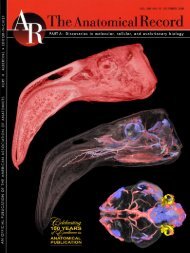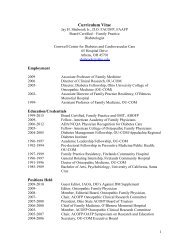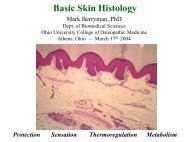DO - Ohio University College of Osteopathic Medicine
DO - Ohio University College of Osteopathic Medicine
DO - Ohio University College of Osteopathic Medicine
You also want an ePaper? Increase the reach of your titles
YUMPU automatically turns print PDFs into web optimized ePapers that Google loves.
from the Syrian border (where Al-Qaeda<br />
fighters were believed to enter Iraq).<br />
According to the battalion chaplain, Capt.<br />
Terry Partin, they all were targets for rockets,<br />
mortars and up to two attacks a day from<br />
explosive devices or small-arms fire.<br />
In those harrowing conditions, Hill took care<br />
<strong>of</strong> his patients–and fellow medics. “A lot <strong>of</strong><br />
times, docs can be alo<strong>of</strong>,” Partin says. “They’re<br />
on call 24 hours, and they never get any rest. But<br />
Dr. Hill was always right there…you’d <strong>of</strong>ten<br />
find him hanging out at the medic stations.”<br />
Hill, “old enough to be some <strong>of</strong> these kids’<br />
fathers,” required his crew to be all business<br />
with the wounded, but made himself available<br />
during down time. “They came to ask me<br />
questions about relationships, marriage, my<br />
opinions about women,” he says. “I had<br />
already been through these things.”<br />
His own life has settled down a bit now that<br />
he’s stateside. Early this year, Hill–husband,<br />
father <strong>of</strong> four, and soon-to-be grandfather–<br />
became a staff physician at Orthopedic<br />
Surgery and Sports <strong>Medicine</strong> in Temecula, Calif.,<br />
and is on staff at Southwest Healthcare System<br />
and Riverside County Regional Medical Center,<br />
a level-one Trauma Center in Moreno Valley.<br />
And last year, Weisskopf tells Today’s D.O. he<br />
looked up Hill. The journalist interviewed him<br />
for Blood Brothers: Among the Soldiers <strong>of</strong><br />
Ward 57, Weisskopf’s book, due out this fall.<br />
Though Hill is readjusting to civilian life,<br />
memories <strong>of</strong> the war stick with him. “It’s one<br />
<strong>of</strong> those things I think about on a daily basis,”<br />
he says. He still will jump at loud noises like<br />
cars backfiring or the sound <strong>of</strong> metal on<br />
metal in the operating theater. It takes him<br />
back to the hair-trigger questions you would<br />
always have on your mind over there: “How<br />
close was that explosion? Was it incoming or<br />
outgoing?” For now it’s neither. But as long<br />
as he’s a military man, there’s always a chance<br />
Hill will see the front a third time.<br />
TODAY’S<br />
<strong>DO</strong><br />
In the Aftermath<br />
Just two weeks after Hurricane Katrina hit the Gulf Coast last August,<br />
Eric Beck trawled the flooded streets <strong>of</strong> New Orleans on a boat with<br />
volunteers and military personnel, looking for survivors. The crew<br />
stopped at every door, calling out for survivors, sometimes cutting the<br />
engine for fear <strong>of</strong> missing shouts for help. Beck and coworkers rescued<br />
five people still living in the attics <strong>of</strong> their homes, severely dehydrated.<br />
Two were diabetic and in desperate need <strong>of</strong> insulin. All were too weak<br />
to protest leaving any more.<br />
Beck should have been preparing for his second year at <strong>Ohio</strong> <strong>University</strong><br />
<strong>College</strong> <strong>of</strong> <strong>Osteopathic</strong> <strong>Medicine</strong> when Katrina struck, but he couldn’t<br />
overcome his nature. A volunteer firefighter and paramedic, Beck’s list <strong>of</strong><br />
volunteer and work activities goes on and on. In addition to being a<br />
student, Beck works part-time at Coolville, <strong>Ohio</strong>, Emergency Medical<br />
Services. His boss there, Joe Egan, only sees him about twice a month<br />
when their schedules collide, but even in that short time, Egan thinks he<br />
made a pretty good hire. “His skills are on par with anybody out there,”<br />
Egan says.<br />
Beck has helped out in emergency rooms and clinics for schools, donates<br />
his time to give local Boy Scouts physical examinations as part <strong>of</strong> the group’s<br />
Annual Physical Examination Program, and is an instructor for OU-COM’s<br />
Annual Continuing Medical Education Program, where he teaches Advanced<br />
Cardiac Life Support. “He’s a pretty busy guy,” Egan says.<br />
No surprise, then, that Beck put school on hold, hopped a flight to Baton<br />
Rouge, La., and volunteered at a makeshift command center for 24-hour<br />
rescue operations.<br />
Though Beck had done rescue missions before, never had he seen anything<br />
quite like this. “There were literally bodies all over the place,” he says,<br />
adding that some were “covered head to toe in, essentially, sewage. ..."<br />
One man’s plight will stay with Beck for a long time. He only knows him<br />
as Travis, a retired New Orleans<br />
police <strong>of</strong>ficer, who was waiting<br />
it out with his wife at a shelter<br />
at Nicholls State <strong>University</strong> in<br />
Thibodaux, La. Travis hadn’t<br />
been religious about taking his<br />
medication before the storm,<br />
but with none available, he had<br />
begun to suffer seizures and<br />
fainting spells. But when Beck’s<br />
team tried to take Travis to a<br />
nearby hospital, he refused to go<br />
without his scores <strong>of</strong> cardboard<br />
boxes filled with personal<br />
treasures. Beck and the other<br />
paramedics couldn’t make him<br />
choose–they loaded all <strong>of</strong> the boxes and Travis onto the ambulance.<br />
It’s not only the victims <strong>of</strong> Katrina that stand out to Beck, it’s also the<br />
people who came to help. He joined hundreds <strong>of</strong> volunteers and military<br />
personnel in that command center in Baton Rouge. “For all <strong>of</strong> the problems<br />
our country and our world have,” says Beck, “people still do rally around<br />
those who are in need."<br />
–Maureen Harmon with Melissa Cabral<br />
Eric Beck, OMS II and 2006 OU-COM Student D.O. <strong>of</strong> the Year (with parents Scott and<br />
Preston Beck), says that after Katrina, “There were literally bodies all over the place.”<br />
summer 2006 31



